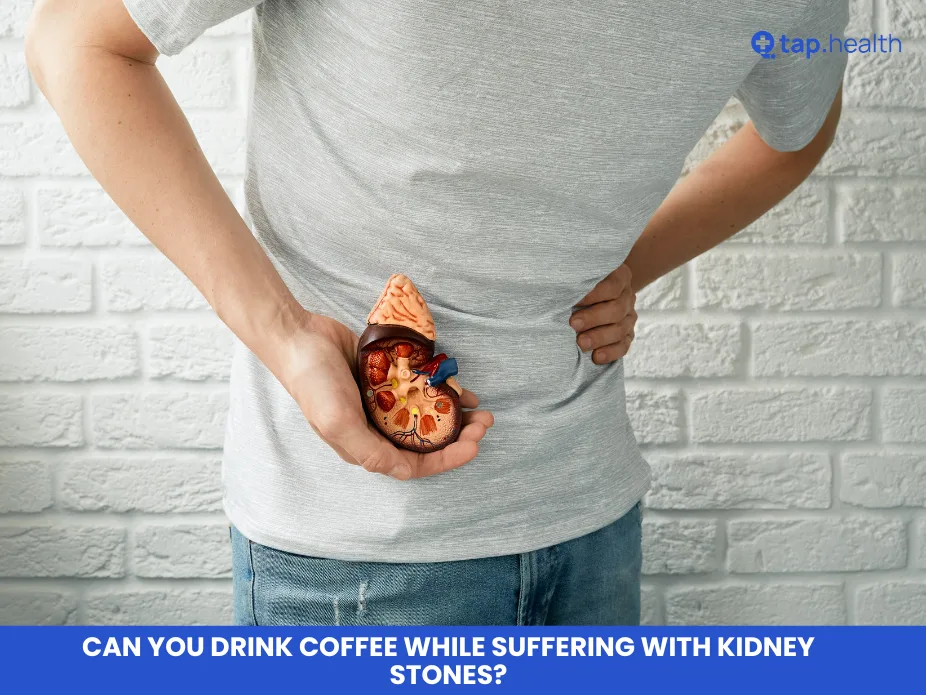Kidney stones cause intense pain and raise many dietary questions, especially about daily habits like drinking coffee. This guide answers the key concern: Is coffee safe during kidney stones? We break down the science of kidney stone types, caffeine’s real impact, hydration balance, and evidence-based recommendations.
What Are Kidney Stones and How Do They Form?
Kidney stones are hard mineral deposits that crystallize in concentrated urine. The four major types are:
- Calcium oxalate stones (most common – 80% of cases)
- Uric acid stones (linked to high purine intake and low urine pH)
- Struvite stones (infection-related)
- Cystine stones (rare, genetic)
The type of stone you have directly influences whether coffee helps or harms.
Coffee and Calcium Oxalate Stones: Should You Worry About Oxalates?
Coffee contains 50–150 mg of oxalates per cup (moderate level). High-oxalate diets can increase urinary oxalate and promote calcium oxalate stone formation in susceptible people.
However, large population studies (Nurses’ Health Study, Health Professionals Follow-up Study) show that regular coffee drinkers do NOT have a higher risk of kidney stones overall. In many cases, coffee intake is linked to slightly lower stone risk because of increased urine volume and citrate effects.
Verdict: 1–2 cups daily is usually safe even with calcium oxalate stones, provided total daily oxalate stays under 1000–1200 mg.
Coffee and Uric Acid Stones: Surprisingly Helpful
Multiple studies (including a 2021 meta-analysis) confirm that coffee (both regular and decaf) lowers serum uric acid levels and reduces the risk of uric acid stones and gout by 20–40%. Caffeine and chlorogenic acids appear responsible for this protective effect.
Verdict: Moderate coffee is beneficial for uric acid stone formers.
Does Caffeine Cause Dehydration and Worsen Kidney Stones?
Caffeine is a mild diuretic, but research shows:
- Habitual drinkers develop tolerance within days
- 1–3 cups of coffee contribute positively to daily fluid intake
- Net fluid balance remains positive unless intake exceeds 500 mg caffeine/day
Real risk comes only from excessive coffee (>4–5 cups) without extra water.
Proven Benefits of Coffee for Long-Term Kidney Health
- High in antioxidants (chlorogenic acid, melanoidins) that reduce oxidative stress
- Associated with 15–25% lower risk of chronic kidney disease (CKD) in large cohort studies
- Linked to lower risk of type 2 diabetes, a major cause of kidney damage
Safe Coffee Intake When You Have Active Kidney Stones
| Situation | Recommended Limit |
|---|---|
| Active stone or recent episode | 1–2 cups (200–400 mg caffeine) per day |
| Calcium oxalate history | 1–2 cups + monitor total oxalate |
| Uric acid stones | Up to 3 cups may be helpful |
| Recurrent stones + dehydration | Switch to decaf or limit to 1 cup |
Always drink an extra glass of water for every cup of coffee.
Best Drinks for Kidney Stone Prevention and Management
- Plain water – aim for 2.5–3.5 liters daily
- Lemon water (fresh lemon juice increases urinary citrate)
- Citrate-rich fruit juices (orange, lime) in moderation
- Herbal teas (peppermint, chamomile, nettle)
- Unsweetened cranberry juice (helps prevent UTIs, use cautiously with oxalate stones)
Drinks to Limit or Avoid
- Sugary sodas & energy drinks
- Excessive black tea (very high oxalate)
- Grapefruit juice (may increase stone risk in some)
- Alcohol (dehydrating + raises uric acid)
Practical Example
A 45-year-old man with recurrent calcium oxalate stones used to drink 5 espressos daily. After reducing to 2 cups and adding 3 liters of water + lemon, he passed his latest stone easily and has had no new stones in 18 months.
Expert Consensus Summary
- Most nephrologists and registered dietitians allow 1–2 cups of coffee daily
- Dehydration, not coffee itself, is the real enemy
- Decaf coffee offers similar benefits with minimal diuretic effect
- Individualize advice based on stone analysis and 24-hour urine results
Can Coffee Affect Blood Sugar Control in Kidney Stone Patients with Diabetes?
For kidney stone patients who also have diabetes (a common combination), moderate coffee (with or without caffeinehas been shown in multiple trials to improve insulin sensitivity and lower the risk of type 2 diabetes progression. However, avoid added sugar or high-calorie creamers. Black coffee or with a splash of milk is ideal.
Final Takeaway You do NOT need to completely give up coffee when you have kidney stones. 1–2 cups per day, paired with excellent hydration and a stone-friendly diet, is safe for most people and may even offer protective benefits. Always discuss your specific stone type and coffee habits with your urologist or nephrologist for personalized guidance.



